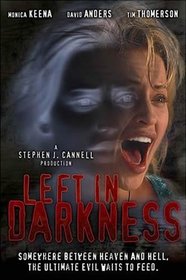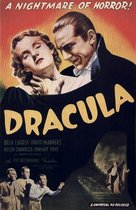Our editor-in-chief Nate Yapp is proud to have contributed to the new book Hidden Horror: A Celebration of 101 Underrated and Overlooked Fright Flicks, edited by Aaron Christensen. Another contributors include Anthony Timpone, B.J. Colangelo, Dave Alexander, Classic-Horror.com's own Robert C. Ring and John W. Bowen. Pick up a copy today from Amazon.com!
Left in Darkness (2006)
Left in Darkness is a varicose mess playing with half-realized ideas that its makers do not seem to grasp at all. Unsurprisingly, it's produced by Stephen J. Cannell, who has created a small industry out of turgid, pseudo-intellectual horror films. So few films make me speechless in their awfulness, but this one wins that extremely dubious distinction.
Celia (Monica Keena) is a girl with a tragic past -- her mother died in childbirth and she was raised by her grandfather, who then also died. Celia, born without the ability to cope with, well, anything, blames herself for much of the tragedy in her life. On her 21st birthday, she and her roommate head to a party to try and drown out the angst with pounding bass. Alas, it's no party for Celia, who is drugged, raped, and left to die of overdose.
Oh, I'm sorry. Did I spoil the movie for you? It really spoils itself, because it continues for another 68 minutes. See, Celia wakes up and finds herself in a netherworld between Heaven and Hell (because she's not really good enough for the one and she's way too boring for the other). Demon zombies, called Soul Eaters, try to consume her soul. Enter dashing if more-than-slightly asinine Donovan (David Anders, "Alias"), who explains the rules. Celia's in a post-death sanctuary and as long as she stays in the light, she's good. What follows is endless irritating scenes of the ceiling lamps suddenly failing or of Celia simply neglecting common sense, all carefully calculated so that our most annoying heroine has to face the Soul Eaters until she can find the next 40 watt bulb to protect her. Oh, and there's a twist, one that I saw coming just from reading the DVD box.
I will say three things for the film in its favor. First, it is made on good film stock, so at least it's not difficult to watch from a purely ophthalmologic standpoint. Second, it is very short, although not nearly short enough. Third, it has a neat glow-in-the-dark DVD cover.
Otherwise, the film is a feast for the misanthropic -- except dissecting its negative points is too much like shooting ground on a continent. Possibly the worst crime the film commits is that it does not reflect any love or care in its making. Ed Wood films are better because they are spirited, optimistic, and obviously labors of love. Left in Darkness is cold, calculated, and obviously devoid of vision.
That the plot is somewhat unique does not spare it from this criticism. There are interesting ideas in here, however nebulous they may be. It seems, however, that not a single person behind the scenes actually recognized this. What might have been an interesting metaphysical thriller turns out to be the same dreck that you can get from almost any direct-to-video screamer or Sci-Fi Channel Original. Worse yet, the filmmakers seem to believe they are being very clever indeed, and characters drone on and on about matters that have been explored better in the past. It's a babble of the banal, and it is not appreciated.
Like its Cannell-produced cousin The Garden, Left in Darkness comes replete with a number of special features, including a self-congratulatory commentary track, a making-of documentary, and "My 21st Birthday," a featurette where the cast and crew reminisce about the year they could start buying alcohol legally. That about a third of the interviewees can't remember that particular day isn't really surprising. Perhaps this film, like the story behind so many 21st birthdays, would be better off Left in Darkness.








